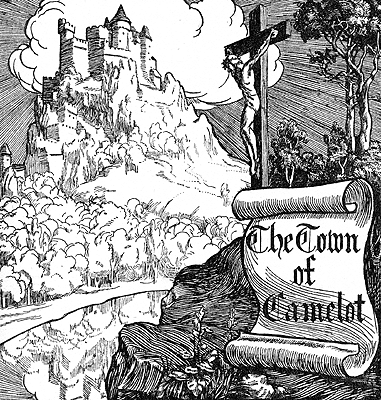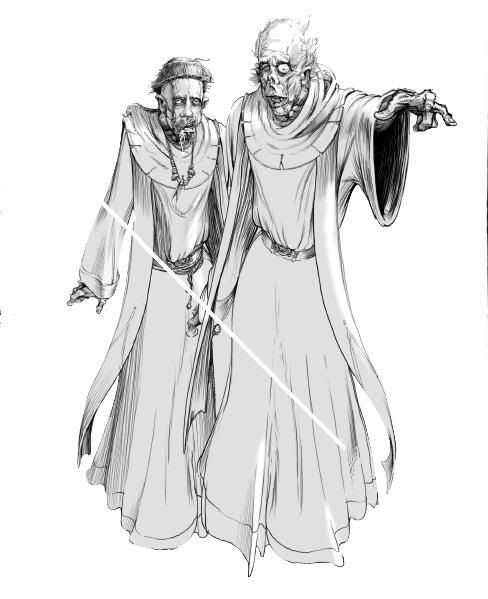What really gets me, though, is when a reviewer slates a book from this second group, without attempting to understand the sockets into which it would have plugged (i.e. ... context). Perhaps this is the sort of thing which is only sacrilege to a Medievalist. Or to someone who does know the context. I don't know. Maybe I should put down my dangerously-poised pen, and say 'each to their own'.
 |
| http://www.earlybritishkingdoms.com/arthur/images/camelot.gif |
If you have time - and if you're about to read this book you must have it to burn - please indulge me in my offer of an introduction to Chrétien de Troyes as an alternative to the overreverent and numbingly serious one offered by Penguin. I do so not because I feel Chrétien's work lacks value. To the contrary, it's without doubt a cultural treasure, offering an insight into the sensibilities and preoccupations of its time. It's more because if you're about to spend the long, long time it is going to take you to read the work, you deserve a health warning. And maybe one of those Parental Guidance stickers Tipper Gore wasted so much time inventing, instead of doing something worthwhile like her old man did and campaigning for some cleaner air.Firstly: what? Since when has the length of a book been a reason not to read it? What does Tipper Gore have to do with anything? And I can confirm that Penguin's edition boasts a mere 521 pages, including introduction, five individual romances, and notes. Some would call that value for money.
One particularly shocking realisation from reading Chrétien's account is that, far from being a great English hero, Arthur is in fact very French. As, of course, was England itself at the time. So possibly one of the more interesting perspectives the Arthurian Romances give us is of England as an extension of France, with Arthur trundling off for extensive stays in Brittany, leaving the estate in the care of one of his counts. Even whilst in England, Arthur lives anywhere but Camelot, he is marginal to most of the stories, and Merlin, Avalon, Excalibur and other elements of the English popular legend are conspicuous by their almost total absence (actually, Excalibur is in the hands of Gawain, not Arthur), although Guinevere's extra-curricular activities with Lancelot are as in-your-face as it gets: apart from being peripheral, Arthur is also a big time cuckold.Is any of this really shocking, or at least worthy of the accusatory tone? Admittedly, Geoffrey of Monmouth's earlier Historia Regum Britanniae (c. 1136) features Merlin, but Chrétien doesn't seem to have used this as his source in the Story of the Grail (c. 1181-1191). And if you've been brought up on a staple diet of the twentieth-century Arthurian pop-fic which does draw on Monmouth's Arthur, the lack of Merlin and Avalon in Chrétien's romance would perhaps be conspicuous. But to criticise the twelfth-century author for not including these elements is a little bit like reading Pride and Prejudices and Zombies, and then complaining that Ms Austen's Mansfield Park doesn't cast enough characters as semi-dead.
 |
| http://fr.wikipedia.org/wiki/Fichier:Eleonora_Jindra2.jpg |
Another example, this time for Penguin's edition of the anonymous Quest of the Holy Grail, got my metaphorical (and, hey, literal) goat:
This story of the legend of the Grail is considered one of the key works on that subject, but it failed to inspire me to saddle-up and take part in the quest. I had heard that this anonymous work from the early 13th century was rich in Celtic symbolism, but I failed to see that. What I saw was a far more Christian text where lofty ideals lead seekers to the most holy of relics. Galahad, the hero of the tale, is so devout and pure that it was very hard to relate and empathise with him. I much preferred Lancelot, whose sin of lust barred his way to a vision of the Grail. He seemed a much more realistic character, but his love of a woman sees him flounder on the quest.
There was also a distinct lack of bad guys and battles to keep us entertained, which made it seem like an action film without a car chase! There was no Mordred or Klingsor to get our blood racing and that leaves the book rather stale. However, it’s not all bad news. I believe every book has a redeeming feature and this is no exception. When King Arthur realises the quest for the Grail will break-up the Round Table, he calls his knights to Camelot for one last gathering, one last noble joust. His short meditation on this is one of my favourite quotes from any Holy Grail book. Knowing many brave knights will die on the quest, he says 'Gracious lords, we have now clear proof that you will embark very soon on the Quest of the Holy Grail. And because I know that I shall never again see you all assembled as you are today, I would have in the meadows of Camelot a tournament so splendid that after our death our heirs will talk of it still'.I might look like a pedant of the worst and most incorrigible variety, but this review illustrates my point, dots the Is, and crosses the Ts. Although the reader acknowledges the context (lofty Christian ideals), he still holds completely anachronistic twenty-first-century expectations of Hollywood-style battles. Hey, this text was as ripping as it got for monks in the thirteenth century; why bemoan the lack of zombies?
 |
| Zombie Monks http://i31.photobucket.com/albums/c355/Balgin/Doodles/Grim/zombiemonks.jpg |
But all of this got me thinking. We're left in a bit of a quandry: can we only really enjoy a text if we understand its context and frame of reference? Should we only save medieval texts from the skip if they press semiotic buttons which which still work 800 years later? Nine times out of ten we don't (want to) have to read the author's biography to know what they're on about and why. But this certainly explains why so many literature students start off hating a work, before eventually singing its praises...

Hi Howy!
ReplyDeleteI find all of this very interesting. In our third year of uni we did a module in the philosophy of literature which was BY FAR the most interesting part of my degree. A lot of philosophers of literature think that there is a "canon" of literary works i.e. "the best" texts which remain unscathed on university reading lists in order to "stay true" to tradition. I think it is a major problem in the study of literature that we are simply told that we must value a text. Before a kid starts reading a Dicken's book, he has probably already been told that he should value it ( if the people telling him so are "educated", of course). The problem is that we're caught in this net of prescribed preferences when it comes to literature that our personal opinion hardly comes in to it. DARE ANYONE SAY ANYTHING BAD ABOUT DICKENS EVER, FOR EXAMPLE.There will always be those bloody books that we will carry on reading & talking about until we are blue in the face, but it all raises the question of why are we reading them? And who said they were so unquestionably good?
But yes, more on-topic, I think that contextual understanding undoubtedly plays a huge part in my estimation of a literary work for the simple reason that I am drawn to stories i can relate to.
But I definitely do not think contextual understanding is the be all and end all. more than anything, to reiterate, I am drawn to stories which I can relate to, and this comes above an interest/understanding of the era. This is why Shakespeare is so popular. He is a writer for all stages and ages. He's timeless. obviously there is an aspect of an interest in Shakespearean times but more than anything i think people's admiration and interest in his works comes from the tales he tells and not in the time he tells it from. But its all a very interesting topic because we find it hard to really know if this is the real reason we do value these texts. We have been bombarded with all these scholars/teachers etc telling us to value certain writers and they have been told by their teachers/scholars etc.. It is hard to really get back to the bare-bones of the text and decide whether we like it for what it is.
There was a really insightful experiment that was done recently where secondary school kids were given an array of poems, with no clues to who they were by .Some of them were written by famous english poets and some were just random ( i think anon ones from london underground or something). They basically all said they preferred the anon ones. This is all very off topic but it does show that we need to give more importance to people's own valuing of a text,irregardless of context/author/style or else what is the bladdy point?!! LET'S START A REVOLUTION! i think the tides are changing though. UNi reading lists are becoming more accepting. There was an arabic lit module at my uni ( only four people did it though-- as it was so unfamiliar to us all! I wish I had done it now..)
This is all very scatty and nonsensical but I do think people need to start questioning the real reason they admire texts and become more open minded about what books to read ( why do most good unis insist on only teaching english literature for example!??!) I think that vaguely ties into your very interesting point about whether medieval texts "work" all these years later-- we need to open up to the possibility that they very well could!!
Far from scatty and nonsensical. I definitely agree about Shakespeare; maybe I've been lucky to see some really fantastic performances, but there's so much about 'what it means to be human' in his works - you don't need to know Jack Shazbutt about the historical Richard iii to be drawn into the debate regarding power and governance, and feel pathos. But Shakespeare's pretty much as canonic as it gets. I guess all of this points towards me saying: studying literature is actually worthwhile! If only it could get me a job..!
Delete